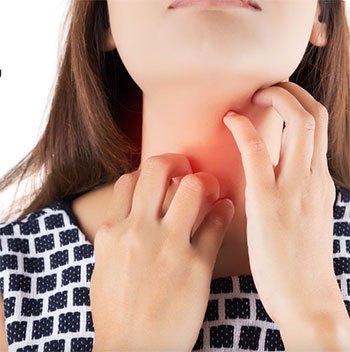There’s nothing quite like stepping out of a warm, soothing shower, only to be greeted by an unwelcome guest: the dreaded itch. Whether it’s a localized tingle or an all-over body itch, this post-shower phenomenon can be both frustrating and downright uncomfortable.
But fear not, for we’re about to embark on a journey to unravel the mysteries behind this itchy situation and find some much-needed relief.
The Skin’s Delicate Balance

To understand why we might experience itchiness after a shower, it’s essential to appreciate the delicate balance that our skin strives to maintain. Our skin is a remarkable organ, acting as a barrier between our bodies and the outside world, regulating temperature, and protecting us from harmful substances.
However, this protective layer can also be sensitive to changes in its environment, and the act of showering can disrupt its natural equilibrium. From the temperature of the water to the products we use, various factors can contribute to post-shower itchiness.
The Hot Water Conundrum
One of the most common culprits behind post-shower itchiness is hot water. While a steamy, hot shower might feel luxurious and relaxing in the moment, it can strip our skin of its natural oils, leaving it dry and irritated.
When our skin loses its protective layer of oils, it becomes more susceptible to irritation and inflammation, which can manifest as itchiness. This is especially true for those with naturally dry or sensitive skin, as the hot water can exacerbate these conditions.
To mitigate this issue, experts recommend taking lukewarm showers instead of piping hot ones. While it might not be as indulgent, it’s a small sacrifice to make for the sake of your skin’s health and comfort.
The Product Paradox
Another potential culprit behind post-shower itchiness lies in the very products we use to cleanse our bodies. From harsh soaps and shampoos to heavily fragranced body washes, many popular personal care items can contain ingredients that can irritate sensitive skin.
These ingredients, such as sulfates, parabens, and artificial fragrances, can strip away the skin’s natural oils and disrupt its delicate pH balance. This can lead to dryness, inflammation, and, you guessed it, itchiness.
To combat this issue, it’s crucial to choose gentle, fragrance-free, and hypoallergenic products specifically formulated for sensitive skin. Look for products that are free from harsh chemicals and loaded with nourishing, natural ingredients like aloe vera, oatmeal, and shea butter.
The Hard Water Hassle
If you live in an area with hard water, you might be familiar with the struggle of dealing with its effects on your skin and hair. Hard water is rich in minerals like calcium and magnesium, which can leave behind a film or residue on your skin after showering.
This residue can clog pores, trap dirt and oil, and even interfere with the effectiveness of your personal care products. As a result, your skin may become irritated and itchy, especially in areas where the residue accumulates, such as the scalp, armpits, and groin region.
To combat the hard water hassle, consider investing in a water softener or using a shower filter to remove these harsh minerals before they reach your skin. Additionally, be sure to rinse thoroughly after showering to remove any lingering residue.
The Invisible Invaders

In some cases, post-shower itchiness can be the result of an underlying skin condition or allergy. Conditions like eczema, psoriasis, and contact dermatitis can all cause itching and irritation, which may be exacerbated by the act of showering.
Allergic reactions to certain ingredients in personal care products or even the water itself can also trigger itchiness. If you suspect an allergy or skin condition is at play, it’s crucial to consult with a dermatologist for proper diagnosis and treatment.
The Temperature Tango
While we’ve discussed the perils of hot water, it’s also important to note that excessively cold water can also contribute to post-shower itchiness. Sudden temperature changes can shock the skin, causing it to become irritated and itchy.
To avoid this, try to maintain a consistent, lukewarm temperature throughout your shower. Gradually adjusting the temperature can also help your skin acclimate more smoothly, reducing the risk of irritation.
FAQs: Scratching the Itch for Answers
Post-shower itchiness can be caused by a variety of factors, including hot water stripping the skin’s natural oils, harsh or irritating personal care products, hard water residue, underlying skin conditions or allergies, and sudden temperature changes during the shower.
Itchiness in the groin area after a shower can be particularly uncomfortable. This could be due to a buildup of hard water residue, irritation from harsh soaps or shampoos, or even a fungal or bacterial infection. Proper hygiene and gentle, fragrance-free products can help mitigate this issue.
Foot itchiness after a shower can be caused by several factors, including dry skin, athlete’s foot (a fungal infection), or even a reaction to certain ingredients in your shower products or the water itself. Keeping your feet well-moisturized and using antifungal powders or sprays can help alleviate this issue.
Itching all over the body can be a symptom of various conditions, including eczema, psoriasis, allergic reactions, and even certain medications or diseases. If you experience persistent, widespread itching, it’s best to consult with a dermatologist or healthcare professional to determine the underlying cause and receive proper treatment.
Also Read: Aqua Velva Vs. Skin Bracer Aftershave: Main Differences And Features
Conclusion: Embracing a Soothing Shower Experience
Post-shower itchiness is a common issue that can be frustrating and uncomfortable, but it doesn’t have to be a permanent fixture in your daily routine. By understanding the potential causes and taking proactive steps to address them, you can reclaim the soothing, refreshing shower experience you deserve.
Remember, your skin is a precious and delicate organ, and treating it with care and compassion is key to maintaining its health and vitality. Whether it’s adjusting your water temperature, switching to gentler products, or seeking professional advice for underlying conditions, taking the time to nurture your skin can go a long way in alleviating post-shower itchiness and promoting overall comfort and well-being.
So, the next time you step out of the shower and feel that familiar tingle, don’t despair. Armed with the knowledge and insights from this guide, you’ll be better equipped to identify the culprit and take the necessary steps to soothe your skin and embrace a truly rejuvenating shower experience.
